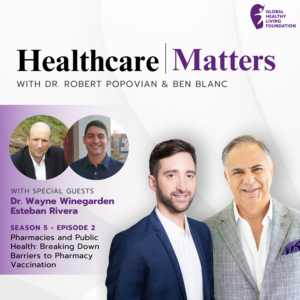Challenges to Vaccine Access for High-Risk Chronic Disease Adults
Vaccine Resources
Removing Barriers to Pharmacy Vaccination: A Path to Better Health and Lower Health Care Costs

“Removing Barriers to Pharmacy Vaccination: A Path to Better Health and Lower Health Care Costs” is a groundbreaking report uncovering a tangled web of regulations preventing pharmacists from efficiently providing vaccines to adult patients.
Led by Robert Popovian, PharmD, MS, Founder, Conquest Advisors and Chief Science Policy Officer, Global Healthy Living Foundation, Esteban Rivera, MS, Associate Director of Data Science, GHLF, and Dr. Wayne Winegarden, PhD, Senior Fellow in Business and Economics at the Pacific Research Institute and Director of PRI’s Center for Medical Economics and Innovation, the study underscores the pivotal role pharmacists play in vaccination efforts and the urgent need for regulatory reform.
The research shines a light on the significant obstacles faced by pharmacists, who are often the most accessible health care providers for vaccinations. These hurdles, including bureaucratic paperwork and redundant requirements, not only contribute to increased health care expenses but also pose a risk to patients’ well-being by delaying essential immunizations.

“Post-pandemic data unequivocally reveals adult patients’ preference for vaccinations at pharmacies, with nearly 90 percent of immunizations provided by pharmacists or pharmacy technicians. In 2023, this preference was underscored as over 80 percent of respiratory syncytial virus (RSV) vaccines were administered at pharmacies across the United States. The convoluted web of state laws regulating pharmacist vaccination authority leads to negative economic impacts and, most critically, denies patients access to care at their preferred location — the local pharmacy.”
— Robert Popovian, PharmD, MS
Chief Science Policy Officer at GHLF
Cost Efficiency
Pharmacy vaccinations are less expensive than those administered in traditional medical settings, offering potential savings for the healthcare system.
Comparative Costs of Vaccination vs. Treatment
The study underscores the economic benefits of vaccination by comparing the relatively low cost of pharmacy-administered vaccines to the significantly higher costs of treating vaccine-preventable diseases. This comparison emphasizes the cost-effectiveness of vaccinations in preventing diseases like the flu and their consequential financial burden on individuals and the health care system.
Accessibility and Safety
Pharmacies offer more accessible vaccination sites, especially in low-income communities, with added safety benefits, such as reduced risk of secondary infections, compared to other healthcare facilities like hospitals.
Regulatory Hurdles
There is a wide variation in state regulatory pathways for pharmacist-administered vaccinations, which can lead to delays and increased costs for patients and the healthcare system.
Documenting Pathways and Costs
The study documents the regulatory pathways across states and the costs associated with navigating these pathways to authorize pharmacist-administered vaccines.
Economic and Health Implications
Delays in pharmacist vaccine administration due to regulatory processes can lead to higher healthcare spending, lower vaccination rates, and increased disease incidence, hospitalization, and death.
Case Study of RSV Vaccine
The paper illustrates the significant cost savings and health benefits of administering vaccines in pharmacies using the newly approved RSV vaccine as a case study.
Public Health Impact
Streamlining pharmacy vaccination processes could lead to higher vaccination rates and reduced health disparities, particularly in low-income communities.
Reducing Regulatory Barriers
Policymakers should consider reducing regulatory barriers to pharmacy vaccinations to improve health outcomes and reduce healthcare costs.

“One of the most important things the study does is get our arms around the trunk of the tree of this Byzantine system we have in terms of the states imposing regulations. Remember, these vaccines are already FDA approved, so all of these delays and costs really aren’t adding anything in terms of patient safety or vaccine efficacy.”
— Wayne Winegarden, PhD,
Director of the Center for Medical Economics and Innovation
at the Pacific Research Institute
Listen to Healthcare Matters to hear a breakdown of the study from Dr. Robert Popovian, Dr. Wayne Winegarden, and Esteban Rivera

In this episode of Healthcare Matters, Dr. Robert Popovian and Ben Blanc take a deep dive into GHLF’s latest vaccine study with guests Dr. Wayne Winegarden, Senior Fellow in Business and Economics at the Pacific Research Institute (PRI) and Director of PRI’s Center for Medical Economics and Innovation, and Esteban Rivera, Associate Director of Data Science and Economics at GHLF.
Tune in to explore how pharmacies can play a pivotal role in public health through streamlined vaccination processes.
Authors

Robert Popovian, PharmD, MS
Chief Science Policy Officer at GHLF
Dr. Robert Popovian is the Founder of the strategic consulting firm Conquest Advisors. He also serves as Chief Science Policy Officer at the Global Healthy Living Foundation, Senior Healthy Policy Fellow at the Progressive Policy Institute, and Visiting Health Policy Fellow at the Pioneer Institute. He previously served as Vice President, U.S. Government Relations at Pfizer.
One of the country’s foremost experts on every significant facet of biopharmaceuticals and the healthcare industry, he is a recognized authority on health economics, policy, government relations, medical affairs, and strategic planning.
Dr. Popovian completed his Doctorate in Pharmacy and Master of Science in Pharmaceutical Economics and Policy degrees with honors at the University of Southern California. He has also completed a residency in Pharmacy Practice/Adult Internal Medicine and Infectious Diseases at the Los Angeles County-USC Hospital and a fellowship in Pharmaceutical Economics and Policy at USC.

Wayne Winegarden, PhD,
Director of the Center for Medical Economics and Innovation
at the Pacific Research Institute
Dr. Wayne Winegarden is a Senior Fellow in Business and Economics with the Pacific Research Institute, Director of the Center for Medical Economics and Innovation at PRI, and the Principal of Capitol Economic Advisors. Dr. Winegarden’s consulting practice advises clients on the impacts from fiscal and economic policies on business outcomes. His economic research focuses on regulatory, fiscal, macroeconomic, health, and energy policies. In addition to his Forbes column, Dr. Winegarden’s editorials have been published in outlets such as the Orange County Register, USA Today, the Wall Street Journal, and The Hill.
Dr. Winegarden has testified before the U.S. Congress; was previously economics faculty at Marymount University; worked as a business economist in Hong Kong and New York City; and worked as a policy economist for policy and trade associations in Washington D.C. He received his PhD in Economics from George Mason University.

Esteban Rivera, MS,
Associate Director, Data Science and Economics at GHLG
Esteban Rivera is the Associate Director of Data Science and Economics at GHLF. He is responsible for the implementation of data-driven decision making across the organization.
Esteban is trained in heterodox economic theory and policy from the Levy Economics Institute of Bard College and has focused on applying those learnings to both health policy research and clinical research in his time at GHLF. In addition to his work at the organization, he is a research award-nominated sports writer.
Was this article helpful?
YesNo


